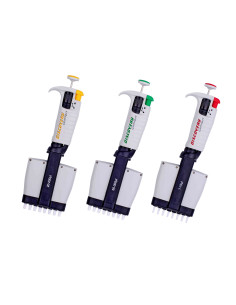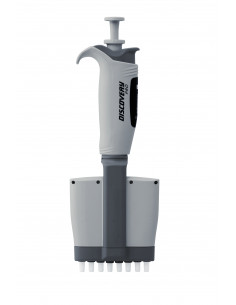MICROPIPETTES MULTICHANNEL
Multi-Channel Micropipettes
Using a single-channel micropipette to fill a 96-well plate can be an inefficient process. Tasks like these can be completed much faster with a multi-channel micropipette.
At Pobel, we offer a selection of multi-channel micropipettes that will significantly reduce the time required for certain procedures. Precision, speed, and ergonomics in a single instrument because laboratory work can be faster without sacrificing quality.
What is a Multi-Channel Micropipette and Why is it Useful in the Laboratory?
Multi-channel micropipettes are instruments designed to dispense multiple volumes of liquid simultaneously. Instead of loading and dispensing each sample one by one (as was done in the past), these micropipettes allow you to work with 8, 12, or more channels at a time.
What does this mean in practice?
- Less effort – Your hands and wrists will thank you.
- Faster workflow – Process more samples in less time.
- Greater accuracy – Reduces pipetting errors and sample variations.
- More engaging work – Let’s be honest, pipetting one by one is about as exciting as watching paint dry.
Types of Multi-Channel Micropipettes: Which One Do You Need?
There is more than one type—high-speed pipetting also comes in different levels.
1. Manual Multi-Channel Micropipettes
- The classic type, but with the advantage of handling multiple channels at once.
- Operate with a manual plunger and require a bit more effort than electronic models.
- Still a significant improvement over single-channel micropipettes.
2. Variable-Volume Micropipettes
- Ideal if you need to adjust volumes on the go.
- More versatile and adaptable for different types of experiments.
Regardless of the model you choose, they all have one thing in common:
They help you work faster and with less effort.
Advantages of Using Multi-Channel Micropipettes in the Laboratory
Here are some benefits of multi-channel micropipettes compared to single-channel ones:
- Time-saving – Complete tasks in a fraction of the time.
- Less fatigue – Reduces strain on your hand and wrist.
- More precise results – Minimizes sample variations and human error.
- Improved ergonomics – Less pressure on your fingers.
- Increased productivity – The faster you finish pipetting, the sooner you can move on to other tasks.
How to Choose the Best Multi-Channel Micropipette for Your Lab
Before buying a multi-channel micropipette, consider the following:
• Number of Channels
Most multi-channel micropipettes come in 8-channel or 12-channel versions. Which one should you choose?
- 8 channels – Ideal for 96-well plates when working with strip wells instead of full plates.
- 12 channels – Perfect for filling an entire row of a 96-well plate in a single pass.
• Fixed vs. Variable Volume
- Fixed-volume micropipettes – Best if you always work with the same volume. Saves time and reduces errors.
- Variable-volume micropipettes – Allow flexibility to adjust volumes depending on the experiment.
• Mechanical vs. Electronic
- Mechanical micropipettes – More affordable and manual, but still highly effective.
- Electronic micropipettes – Reduce effort and increase precision.
• Tip Compatibility
- Some micropipettes require specific tips, while others accept universal tips.
- Make sure to choose a model that fits your needs and budget.
Multi-Channel Micropipette Maintenance and Calibration
If you want your multi-channel micropipette to last and continue functioning accurately, follow these tips:
• Regular Cleaning
- Use isopropyl alcohol to clean the surface.
- Ensure that no residues accumulate in the cones.
• Periodic Calibration
- Depending on usage, calibration is recommended every 3 to 6 months to maintain accuracy.
- If you notice that one of the channels is not functioning properly, it might be time to replace internal parts.
With proper maintenance, your micropipette will remain a reliable tool for years to come.
Buy Multi-Channel Micropipettes at Pobel and Start Working Faster
If you’ve read this far, you probably already know that you need a multi-channel micropipette in your life.
At Pobel, we offer the best options in 8-channel and 12-channel micropipettes, backed by the quality guarantee your lab needs.
Why Choose Us?
- Wide range of models – From single-channel to multi-channel micropipettes to meet your needs.
- Guaranteed quality – We work with the best brands in the industry.
- Expert advice – We help you choose the ideal micropipette for your work.
Contact us today for more information—no obligation.
Frequently Asked Questions
Is it worth switching from a single-channel to a multi-channel micropipette?
- If you work with 96-well plates or perform repetitive pipetting, yes.
- Saves time and reduces manual effort.
How often should a multi-channel micropipette be calibrated?
- It depends on usage, but typically every 3 to 6 months is recommended.
Are multi-channel micropipettes compatible with all pipette tips?
- Some require specific tips, but many work with universal tips.
- Always check compatibility before purchasing.








